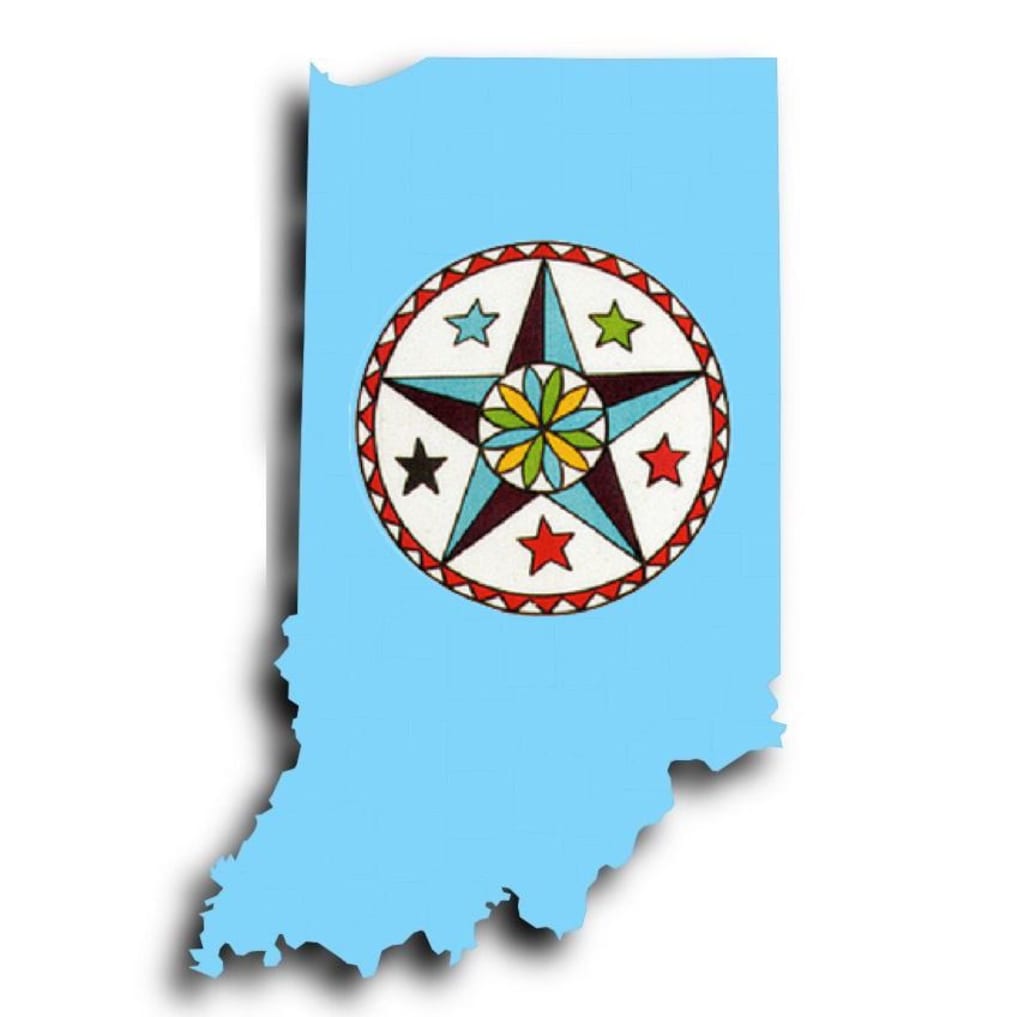Tippecanoe and Telemischief Too
Chapter One of an Occult Hoosier History

Will Harrison looked around the grounds of old estate. It had been - what? Two decades? Twenty-four years since he had last taken his leave? The grouse still called and drummed from the copses of trees nearby, but the landscaping had not been well-maintained and the brush was overgrown. However the brick façade upon which he had insisted, with its double layer of graceful columns, still cast its spell, speaking of power and privilege just like the aristocratic homes of his native Virginia.
The interior was still in good shape. The leather upholstered ottomans and armchairs had been carefully draped in sheets to protect them from decay. He strode into his office and over the empty desk - it had always been piled high with papers and folders and envelopes when he had worked here - Will gazed out the window. Memories flooded back to him. He could almost swear he saw the shadowy figures emerging from the trees - Tecumseh and his warriors, their faces painted in war paint, gripping their muskets and battle axes and hunting knives.
Back on that day, Will had calmed his aides and guards, instructing them to let the visitors enter the mansion without leaving their weapons outside. They had protested, but he had persevered. Tecumseh, the self-professed uniter of the Indian nations, had brought his own translator and had delivered a long monologue of complaint. The white men should not negotiate with the individual chiefs and clans but with the entire nation if they wanted to acquire land in their territory. Will had pointed out that since the "nation" did not have a common tongue which all understood, it was actually many nations, each of which could make their own decisions and sign their own treaties.
Tecumseh had responded violently, giving another speech which he almost screamed and drawing his hunting knife from his belt. In response, Will had down his army saber from its sheath and laid it on the desk which separated him from the band of angry supplicants. The translator did not dare to translate Tecumseh's invective into English, perhaps fearing the consequences. At that point, Tecumseh's brother, who had been standing beside him, whispered into his ear. Tenskwatawah carried no weapon, only a strange stick, decorated with beads and feathers which he rolled between the palms of his hands. He was known among the tribes as a powerful spiritual leader, a so-called "prophet." He provided the religious impetus behind Tecumseh's efforts to unify the nations. The “prophet” urged the nations to abandon the white men’s ways and return to their traditional customs and beliefs. If they “purified” themselves in this way, the Great Spirit guaranteed them success in their struggle to resist further incursions into their ancestral lands.
Will had been impressed by Tenskwatawah's calm and self-assured manner. The words he spoke to Tecumseh were not translated - they had been audible only to the great leader. Whatever it was he had said took immediate effect. Tecumseh put his knife back in his belt and made a signal to his companions, at which they all turned and left the room peacefully and quietly - almost silently. Tenskwatawah was the last to depart and before he took his leave, he had nodded briefly to Will, met his eyes and made a gesture with his decorated stick. Then he vanished along with the others.
Will kept in touch with Tenskwatawah during the following months, sending letters by messenger which must have been read and then rendered into Shawnee by Tecumseh’s translator. Tenskwatawah complied with some of Will’s requests but ignored his other messages, including his warning about the massive number of dwellings which was accumulating at the confluence of the Tippecanoe and Wabash rivers. Will warned the prophet that such a large collection of habitations might be seen as a threat by the territorial authorities (of which Will himself was he most prominent) but no reply was forthcoming. Alerted by his informants that “Prophetstown” was still increasing in size and that the warlike Tecumseh had departed in order to recruit more members of his nascent confederation, Will decided that it was time for another direct confrontation.
Exercising his official authority as territorial governor and his personal power of persuasion, Will assembled a force of about 1000 men from local militias, regular army and a volunteer company from nearby state of Kentucky. They made camp near “Prophetstown” and Will obtained an agreement from Tenskwatawah to meet the following day. The officers of the companies under his leadership did not share his faith in the prophet’s commitment to peaceful resolution of the encounter, and so sentries were doubled overnight and all troops slept fully clothed with muskets ready.
In the early morning hours, the camp was awakened by gunfire from the sentries and in the next few moments they were under attack from all sides. As soon as one wave of warriors withdrew, another took their place, and then another and another until dawn arrived. Will’s forces held, but a number of his chief officers were killed, along with almost 200 soldiers. Pursuing the enemy to “Prophetstown,” they found no more than 50 dead and the village deserted. Will ordered it burned to the ground, including the vast storehouses full of corn, beans and gunpowder. He disciplined the men who scalped and desecrated the bodies of the enemy slain. “We are not the savages in this conflict.”
Will’s attempts to present the chaotic engagement as a decisive victory met with quite a bit of resistance, but the fact that Tenskwatawah’s religious movement seemed to have come to an end at that moment was eventually acknowledged. For better or worse, “Tippecanoe” was permanently linked to Will’s name. Some settlers only knew him as “Tip.” At one point, Will had arranged for the printing of a broadsheet at his own expense which explained that the river was named not for the hazards it presented for small watercraft but for a large fish which was found in its depths, called “kiteepihkwana” in the Miami language. In spite of this, the nickname remained.
By the end of the following year, the country had been fully at war, not with the Indian nations but with their old colonial master, Britain. Will resigned as governor to take on a military commission as major general. In the following year, he finally met Tecumseh and his followers in battle. They had aligned themselves with the British and Will engaged a mixed British and Indian company while leading a force deep into Canadian territory. Tecumseh was with them and fought bravely and recklessly, resulting in his death early in the engagement. Without their leader, his followers abandoned the British and Will won an easy victory. With Tecumseh, the dream of a native confederacy died as well. After that, Will had heard no more about Tenskwatawah, except that he had lost any spiritual influence over his countrymen and was living a quiet and unremarkable life.
Will had also tried to return to private life after the war, but the lure of celebrity and fame had been too strong to ignore. He had run for office, first as Ohio state representative, then as state senator and finally as US senator. In 1828 he had served as an ambassador to the new South American republic of Gran Colombia, which had finally separated itself from Spain just as the North American colonies had broken with Britain. He had not lasted long. It was difficult to remain neutral when he found Simón Bolivar’s dictatorial tendencies so offensive to his beliefs about the principles of democracy. He had returned to find that the new US president, Andrew Jackson, shared many of Bolivar’s anti-democratic tendencies.
Admittedly, Will’s distaste for Jackson had a personal component as well. "Old Hickory's" victory at New Orleans outshone his own accomplishments, even though it had occurred after the war was officially over and involved an alliance with pirates and criminals. Recalled by Jackson from his ambassadorship in Gran Colombia, Will had tried once again to return to private life. The abuses of the Jackson administration, combined with the encouragement of his many friends in the capitol, had finally convinced him to embark on a campaign for the presidency.
Jackson’s second term was coming to an end and he had appointed his Vice President, Martin van Buren, as his heir. In Will’s opinion, van Buren was not a man of action but a mealy-mouthed lawyer, as well as a New York Dutchman, who would have difficulty gaining support in the southern states. Never-the-less, van Buren had Jackson’s support and Jackson still retained a good deal of popularity. Will’s party, the newly-formed Whigs, could not decide upon a single candidate, so Will was one of three. Their hope was that they would secure enough votes that the House of Representatives would have to decide the outcome, giving them a perhaps unlikely opportunity to unseat Jackson’s surrogate.
At any rate, here he was visiting his old stomping grounds. He had never imagined the amount of travel that a national campaign would require and was relieved that all of the speech-making and hand-shaking would soon be over, whatever the end result.
As Will and his entourage prepared to depart, a staff member discovered a package on the front steps wrapped in deerskin and carefully tied with leather thongs. As an aide examined it to make sure that it was safe for him to handle, Will waited patiently. He knew with absolute certainly who had left the parcel and he had a good idea about its contents. The only mystery was how Tenskwatawah had known the exact time of his visit, since Will had only decided on the previous morning to make the 60-mile side trip from the new state capitol of Indianapolis.
When he finally loosened the thongs, Will discovered, as he expected, a stick decorated with beads and feathers. If it was not the same implement the Indian prophet had carried with him, it was a close duplicate. Will twirled it between his palms and brandished it for several minutes. Was intended as a curse or as a blessing? He had no way to tell. The prophet’s brother had fallen in battle because of his own foolhardy bravado not because of any treachery on Will’s part, so he felt no responsibility in that regard. Deciding that he would interpret this little gift as a peace offering and a symbol of good luck, Will tucked it into his belt next to his army saber and gave the sign for the company to take its leave.
The immediate effect of the medicine stick was negligible, if it had any effect at all. The Whig gambit of multiple candidates failed decisively, and van Buren was elected by a wide margin. Will himself did much better than any of the other Whigs, but came nowhere near the Dutchman’s performance. It was back to private life until the next campaign season in 1840.
As the sole Whig running for the highest office in this election, Will kept the stick with him at all times. He was advised that Tenskwatawah had passed out of the mortal world in the same year that he had first received the package and that native practitioners of the dark arts could transfer their souls to inanimate objects, but Will brushed aside such puerile superstitions. The artifact seemed to have no inhibitory influence on the election, which Will won handily. Somehow the stick seemed to go missing, however, when he was dressing for the inauguration ceremony. Search as he might, it was nowhere to be found, so he proceeded with the events of the day, giving a two-hour speech, parading through the streets and attending three balls in the evening.
Three weeks later, after completing his daily morning walk, Will took a chill and felt a fever coming on. In another week, despite (or perhaps because of) the best efforts of the medicine of his time, the newly-elected head of state took his last breath and became the first US president to die in office. Vice-President John Tyler was sworn into office as his replacement two days later, but Tenskwatawah’s stick remained undiscovered. The Battle of the Tippecanoe had claimed its final casualty.
About the Creator
Enjoyed the story? Support the Creator.
Subscribe for free to receive all their stories in your feed. You could also pledge your support or give them a one-off tip, letting them know you appreciate their work.






Comments (2)
Very ambitious to cover a little known part of history! Very well written, and insightful into how important the military forces of the native americans were douring this era And I always love to learn something in a short story (first chapter in this case) I've become convinced american history is so much more complex and nuanced than the snippets we learn in history class. Wild passionate disagreements about just about everything have been very much alive for most of america's history since the 1700s and we got through it all.
Congrats on your placement!! 😁